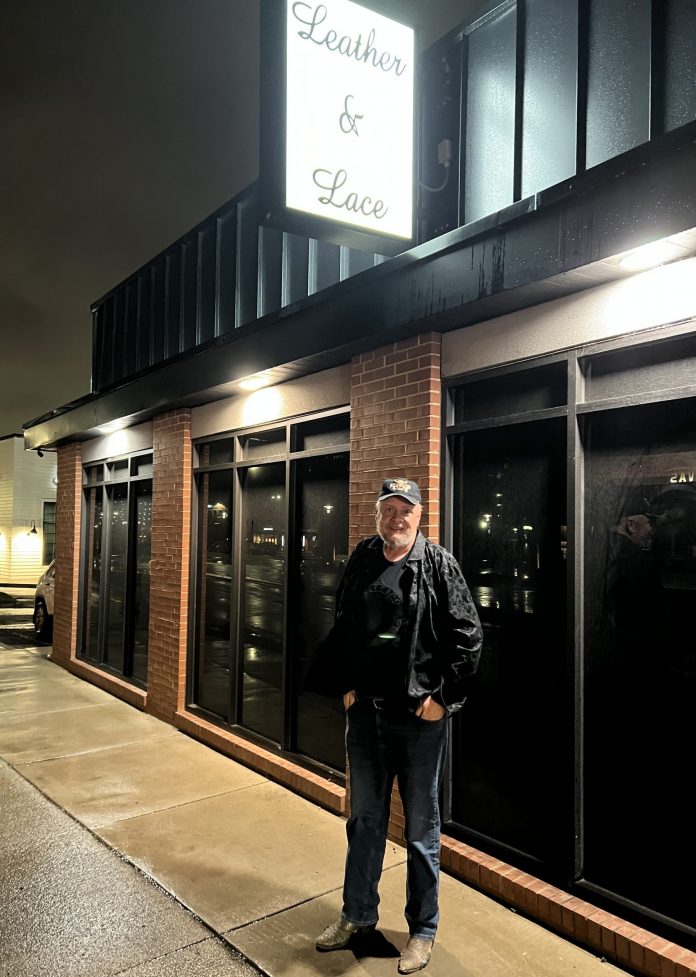The Founders Interview
A conversation with
David “Slim” Baucom
Founder of MAL Entertainment
Interview and story by ED Founder Don Waitt
(NOTE: this story appears in the May 2023 issue of ED Magazine.)
“Double your girls. Double your money.”
– David “Slim” Baucom
There were ten of us sitting at a long table at StripSteak, a fancy steak restaurant at Mandalay Bay Resort & Casino in Las Vegas. Four people on each side of the table, and one at each end. Nine of them were industry heavyweights—a few First Amendment attorneys and the owners and operators of the industry’s top adult nightclub chains like Rick’s Cabaret, Spearmint Rhino, Deja Vu, The Men’s Club and The Pony Clubs. The tenth person, an interloper, was myself as ED Publisher. The good thing about being a poor journalist is knowing that at least when the check comes, nobody expects you to reach for it.
The dinner was in full swing. Lots of steak and lobster and fine wine, lots of conversation, from sports to the state of the industry to gossip about the latest club sales and acquisitions. At one point there was a lull in the conversation and that’s when one of the diners at the table spoke, saying in a slow Southern drawl, “You know why there are no big dogs at the pound in Charlotte?”
With those words, everybody at the table froze. Forks stopped halfway from plate to mouth. Wine glasses were set back down. Everybody turned to look at the man who had just spoken.
Not because of the question he had asked.
No, it was because of who was posing the question.
That person was David “Slim” Baucom, owner of Charlotte, North Carolina-based MAL Entertainment, which has operated dozens of adult clubs on the East Coast for the past 35 years.
Why everyone was surprised is because Slim doesn’t talk a lot. He’s more of a listener. If you want Slim’s opinion on something, you’re going to have to ask him for it. So for the diners at the table, hearing Slim on his own, without prompting, start a conversation was truly a surprise.
And it only got better.
“What you do is this. You get the biggest dog at the pound,” said Slim. “Then you dig your hole six feet deep. You put the body in the hole and cover it with a few feet of dirt. Then you put the dog in the hole and cover him up with the rest of the dirt. That way when the police dig down, when they get to the dog, they say, ‘Oh, hell, it’s just a dead dog,’ and they start searching somewhere else.”
When Slim finished you could hear a pin drop.
Nobody said a word.
Slim went back to cutting his steak.
Finally, I had to ask: “Slim, where in the world did you hear that?”
Slim answered with one word, but he drew the word out so it sounded like two words.
“Goo-gle,” he said.
* * *
Baucom is the embodiment of the saying, you can’t judge a book by its cover.
He can attend a two-hour ACE National Board of Directors meeting and not say a single word, and later at dinner calmly tell a hair-raising story about a subject you’d expect to more likely hear about in a Quentin Tarantino movie.
You usually only see Slim in blue jeans, very seldom slacks. Almost always in a black shirt, usually a black t-shirt. No Bruno Magli loafers for him; shit-kicker cowboy boots are just fine. No Rolex on his wrist or diamond ring on his pinky finger. No lobster for him; he’s a steak—cooked medium, please—and french fries kind of guy.
Someone standing behind Slim in line at the bank might look at how he is dressed and at his big rough hands and think they’re standing behind a day laborer. But looks are deceiving, because they’re actually standing behind someone who has a hell of a lot more money in the bank than they do, someone who has a black Amex card in his wallet, someone who has a passport at home with stamps in it from almost every country on the planet, someone who owns 10 adult nightclubs and as many houses, someone who owns enough cars, trucks and motorcycles to fill a car sales lot, and someone who has enjoyed the company of hundreds of the most beautiful women in the country.
Like I said, looks can be deceiving.
For this interview, I meet Slim at the MAL Entertainment offices in Charlotte, NC. Those offices look nothing like the corporate offices of other club chains. The MAL offices are in a giant warehouse on a multiple-acre lot enclosed all around by a tall fence. There are about 20 or more pickup trucks parked outside the gate. Inside the building is a labyrinth of offices housing MAL employees as well as employees for Baucom’s sons’ other businesses, from glass manufacturing to trucking. Just about everybody in the warehouse building and the sheds and garages on the lot is big and bearded. You feel like you’ve stumbled into a ZZ Top music video.
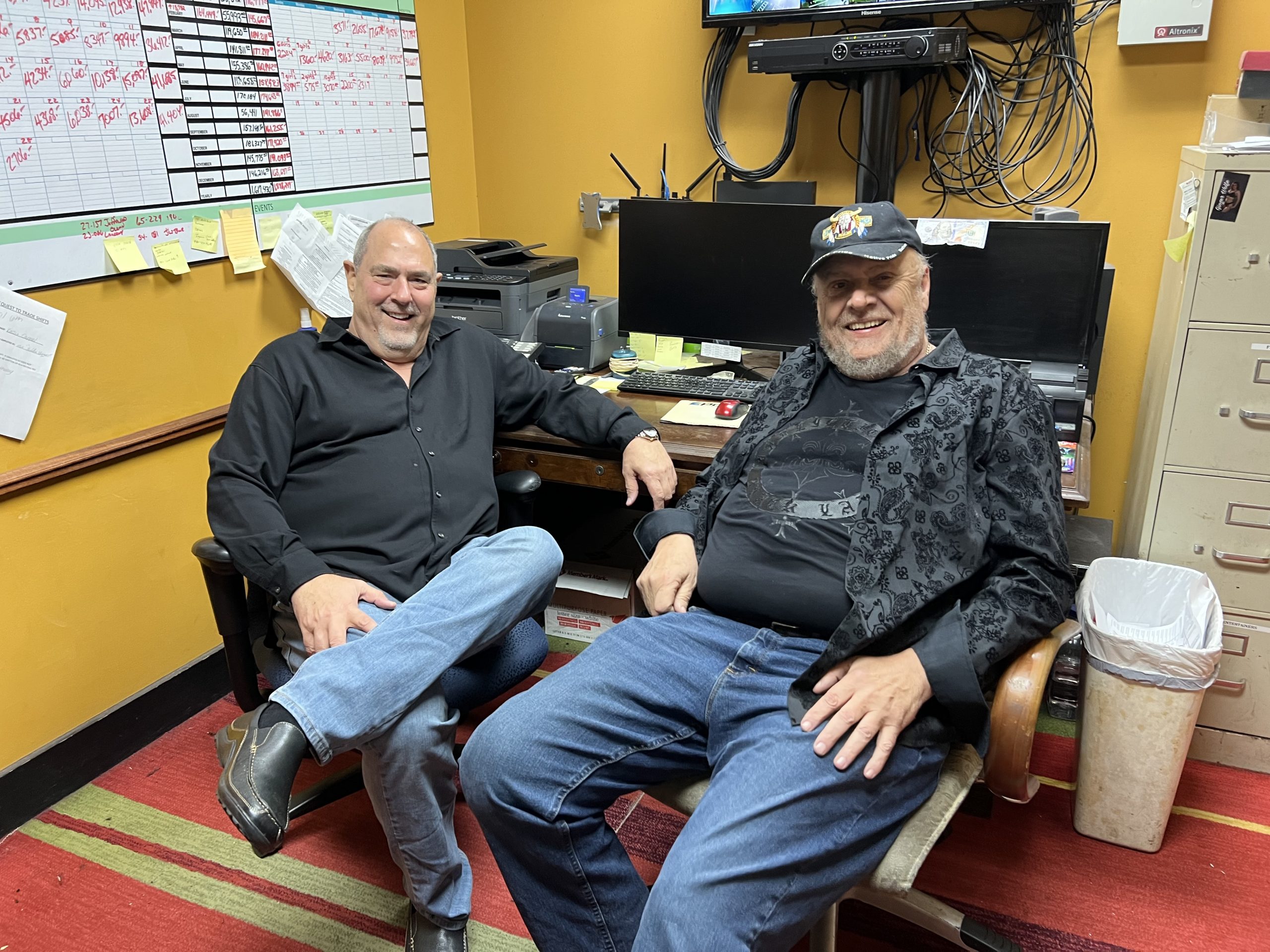
“What’s that?” I ask Baucom as what appears to be a giant wolf slinks by one of the open garage doors. “Just an old junkyard dog,” says Baucom.
Baucom doesn’t walk. He ambles. Kind of like John Wayne. More often than not, both his hands are in his pockets. You never see him rush. You never see him flustered. For someone who has opened and operated dozens of strip clubs over the past three and a half decades he always seems calm as a cucumber.
Upstairs behind a locked door that you have to be buzzed in through is Slim’s office. It’s a cozy and comfortable office, made more so by a small attached kitchen, a bedroom and a full bathroom. Memorabilia covers the walls and an oversized desk is stacked high with papers and magazines. Slim sinks into a well worn comfortable chair and I sit across from him in an equally well worn comfortable chair.
In that Man Cave, Slim is all about the business of running stripclubs. In one local newspaper article, he was quoted as saying, “This is a business for me. I ain’t going to put my bathrobe on and go try to play Hugh Hefner. It’s a business like any other business around town.”
“When I got to the fourth club, I had to make a decision because I was still working for the city.”
– Slim
Slim’s current club lineup includes The Gold Club, The Gentlemen’s Club, The Crazy Horse Showclub, and two Leather & Lace clubs in Charlotte; Scores in Mooresville, NC; Tassels Cabaret in Matthews, NC; Leather & Lace in Gastonia, NC; the Crazy Horse Showclub in Rock Hill, SC; and Sammy’s in Pensacola, FL.
That night we will go by three of the clubs. Later I realize that Slim chose those clubs intentionally because each of them represented a different tier of stripclub, a concept that he addresses in his interview. We start with Scores (an A club), then go to The Gentlemen’s Club (a B club), and finish the night at the original Leather & Lace (a C club) on South Boulevard.
Slim has read the first two interviews from the Founder’s Interview Series that I did with Harry Mohney and Michael J. Peter. He’s nervous that his interview won’t be as interesting.
“ We’re gonna have to come up with some shit for me,” says Slim.
* * *
WAITT: Where were you born and raised?
BAUCOM: I was born in Richmond, Virginia. I had three brothers and one sister. I was the oldest. We moved down to Charlotte when I was seven years old. Been here ever since. I used to spend my summers in Lumberton, North Carolina. There’s an Indian reservation there, the Lumbee Tribe of North Carolina. My mother was Lumbee.
WAITT: Couldn’t you have been part Seminole so you could get a piece of that casino revenue?
BAUCOM: Nope. Our tribe isn’t even federally recognized. We didn’t get nothing.
WAITT: One news story gave your name as David Baucom Jr. Are you a Junior?
BAUCOM: Yes.
WAITT: What did your father do for a living?
BAUCOM: He was a jack of all trades, things like heating and air conditioning work. He was a very smart fellow. Anything he put his mind to, he could do.
WAITT: Is that where your work ethic came from?
BAUCOM: At nine years old I had two paper routes, and I was cutting grass, doing odd jobs. I started buying my own school clothes. My Mom didn’t have to give me school money. I took care of myself. Then I went to work at a service station when I was 12. Worked there after school. I got straight As through school from the first grade all the way through. Matter of fact, they kept trying to get me to skip three grades and my Mom wouldn’t let me. But when I started high school, I done three months and then I quit. So basically I made it to the ninth grade.
WAITT: There is no question that you are now and for a long time have been incredibly successful and wealthy. Does that mean high school and college are overrated?
BAUCOM: I think common sense and a good work ethic are the main ingredients to being successful. I know there’s some jobs, like brain surgery, that you can’t do without the proper education. But in the basic work world, a good work ethic is what you need.
WAITT: How did you get the nickname Slim?
BAUCOM: A friend of mine named John L. Scott was the first one who started calling me that and it just kind of stuck. As a kid I could stand under a clothesline in the rain and not get wet. All the way through my 30s I was very skinny. Now people ask me why they call me Slim.
WAITT: You may be the tallest stripclub owner in the history of the business. How tall are you?
BAUCOM: Six-foot-six. I was always tall. My dad was also six-foot-six.
WAITT: Did you play sports? You had the height.
BAUCOM: I played a little basketball. But I was too busy. Soon as I got out of school, I ran into a job.
WAITT: What other jobs did you do before you bought your first strip club?
BAUCOM: At 17 I went to work at the David Tree Company. I became a tree surgeon. I worked there for nine years. Then I went to work for the City of Charlotte as a tree supervisor over the tree department for nine more years. So for the first 18 years of my life, I climbed trees.
WAITT: At 6-foot-6 you were a bit big to be climbing trees.
BAUCOM: But I could reach all the limbs.
WAITT: How did you go from trimming trees to your first club?
BAUCOM: The city pays fair, with great benefits, but I was still living from paycheck to paycheck, so I always had some hustles on the side. Doing different stuff, bodyguard work, just numerous things. I don’t know if you need to write this down or not, but at one time I was a huge drug dealer in Charlotte and I got busted in 1984.
Baucom pauses then says, “Go ahead. You can put that part in. I don’t mind. It’s just me.” In a newspaper interview, Baucom said, “I’ve learned the hard lessons of life, that’s for sure. It ain’t always been easy. I made bad decisions. In the early ’80s, I had a wife, three kids. I was struggling to make it. The only answer I come up with was to start selling drugs. I’ve never done drugs in my life. Of course, I got busted.” Baucom avoided prison, but says it’s a black mark. “I will regret it to my dying day.”
“After I got busted, I never sold that stuff again. Instead, I bought a small neighborhood bar as a secondary source of income. Every year I changed the concept of it. One year, it was a rock and roll bar. Then it was a country bar, then a biker bar, then an Indian bar, and I finally turned it topless in 1987. And lo and behold, sex sells.
“I had met my future (second) wife, Jackie, at another stripclub in town called the Paper Doll Lounge. She was a dancer and her nickname was Strawberry. So we were talking one night and jokingly, I said, ‘Well, let’s turn my club into a topless joint.’ And she said, ‘Count me in.’ We opened it together, and she was very instrumental in the success of it.”
WAITT: And that was the first Leather & Lace. Why that name?
BAUCOM: I got it from a dancer a few years earlier when I was at a stripclub. We were just chitchatting and she said one day she would like to own a stripclub and if she ever got one she would name it Leather & Lace. I thought, now that’s a cool name. And I’ll be darned, a couple years later I got my stripclub, so that’s what I named it.
WAITT: How big was that first Leather & Lace?
BAUCOM: About 2,000 square feet. I still have it.
WAITT: Okay. You have one club, then what happens?
BAUCOM: The club started doing good money. So the next year I bought another one. Then it seemed like every year I was picking up another one. When I got to the fourth one, I had to make a decision because I was still working for the city.
WAITT: You had four stripclubs operating and you were still working full time for the City of Charlotte?
BAUCOM: Yes, and it was getting to be too much. So I left the city and went out on the clubs full time.
WAITT: Did everybody who worked with you at the city want to be your best friend?
BAUCOM: They were some of my best customers.
WAITT: What made you decide to take your rock/country/biker bar and turn it into a stripclub?
BAUCOM: When it was just a neighborhood bar, I would only have crowds on Friday and Saturday nights. But the stripclubs were having crowds every night of the week. So here I am trying to survive off just a few nights a week and they’re generating income seven nights a week, and during the day too. And they could charge more for drinks.
WAITT: How long were you in the stripclub business making all that good money before you said to yourself, “Oh my God, I had no idea that I’d have to work with all these dancers. And what a pain they are.”
BAUCOM: I think it was the first club.
WAITT: Everybody thinks owning a stripclub with a bunch of sexy women is going to be heaven on earth.
BAUCOM: There’s no shrinking violets in a stripclub. I had a guy ask me once how many dancers I had working for me and I told him about 500. He said I was incredibly lucky to have 500 beautiful women around me all the time. I asked the guy if he was married and he said yes. I told him, “You’ve got one woman around you who gets PMS one week out of the month. I’ve got 125 women every week of the year. Nonstop.”
The guy said, “Oh, right.” The reality sunk in. It’s like that ED T-shirt you all came up with that said, “It’s a dancer’s world; we just live in it.”
WAITT: You bought your first club with savings from your city job salary and then your next clubs from the profits from each new club you added. Did you not want partners or investors?
BAUCOM: No. I’ve always been very good about money management as far as saving money. I don’t live a high lifestyle. I had two guys that had 10 percent each of one of my clubs, and I ended up buying ‘em out. I like it better when it’s just me. If I make a wrong decision, it only affects me. But if I got your money and I make a wrong decision, I don’t want nobody to lose their money.
WAITT: Is it also because partners and investors tend to meddle?
BAUCOM: Yeah.
WAITT: Didn’t you also promote wrestling shows on military bases overseas at one point? How in the world did you get into that?

BAUCOM: Yes, I did for a few years. My wife Jackie had aged out on the stripping thing. There was a pro wrestler that used to come in to the club and he started talking about training her. She went down to a tryout and she liked it. She became very successful at it. She won the title of Rookie of the Year. I bought the NWA for this region and started promoting wrestling shows. Then we started the World Wrestling Alliance where we did matches on military bases all around the world from Saudi Arabia to China to Germany to Korea.
WAITT: The vast majority of adult nightclubs across the country are single owner clubs. After that first club, why did you keep buying and opening more clubs?
BAUCOM: For me, it’s the accomplishment of it. The drive. The best part for me is finding the club, remodeling it, getting it going. I enjoy getting there with my work clothes on, tearing up carpet and rebuilding it and getting it ready. Kick it off for the first two weeks, then I want to hand the keys to somebody else and move on to the next one. I was up to 23 clubs at one time, years back. Now we’re down to about 10.
“I don’t want to be like McDonalds. I want every one of my clubs to have its own identity.”
– Slim
WAITT: Why did you scale down?
BAUCOM: I just shrinked down to where, right now I can, with an hour’s notice, be at any one of the clubs. I also realized that none of the boys (Baucom’s three sons) have said, ‘I want to run these clubs.’ Plus me getting older and everything else.
WAITT: You enjoy the negotiations as much as you enjoy buying a new club. But you don’t want the deal to be too easy do you?
BAUCOM: Yeah, yeah. You want to have to work for it. You want to play the car salesman game. They go high, you go low. You meet in the middle somewhere. You want to get creative and structure the deal as a win-win.
WAITT: You have an assortment of clubs, some small and blue collar, some large and white collar. Was that diversity planned, or you were just buying what was available?
BAUCOM: I did it because I wanted everybody’s money. I didn’t wanna leave nothing on the table.
WAITT: Most club chain operators want to build a brand so they use the same name for all their clubs, like Spearmint Rhino or Deja Vu or Rick’s Cabaret. Why have you not done that?
BAUCOM: I don’t want to be like McDonald’s. Every McDonald’s looks the same. I want different clubs. Some of the club chains you walk in and it’s the same carpet, the same layout. You know right away who owns the club. I want every one of my clubs to have its own identity.
WAITT: Which clubs are easier to operate, the blue collar clubs or the white collar clubs?
BAUCOM: Definitely the smaller B clubs, the working-class clubs.
WAITT: Your first four clubs were called Leather & Lace, but when you started buying more clubs you kept some of the club names and changed others.
BAUCOM: Every one was different. Some of ‘em kept the name, some of ‘em changed. It depended on their reputation and their history, and whether I thought a club needed to be re-branded. If they had a good name for the club and a good reputation, why change it?
WAITT: You have certainly branded the name, MAL Entertainment. You told me once that MAL stands for “misfits and losers?”
BAUCOM: No, I told you it stands for “managing assholes and losers.” But actually, it stands for MALE-entertainment since we are providing entertainment for men.
WAITT: I like the other two explanations better. What is unique about running an adult nightclub in the Carolinas compared to markets like Texas or Florida or New York?
BAUCOM: I had a club in upstate New York, but it was in a small market. I’ve never had one in New York City where clubs are doing $10 to $20 million a year. They have clubs there that do more in a month than some of my clubs do in a year.
I try to instill in my managers and other club owners I talk to, that you can have a B club, but your operation should be on an A club level. There should be no difference in how a B club and an A club operate. The operational part of it should be the same. Just because you have a B club or even a C club, you don’t lower your operations. If you got a C club with a dirt floor, you operate it just like it was a New York club doing multi-million dollars. It’s the service, the hospitality, the operations. There should be no difference between any club’s level of operations, because the customers expect the best, whether they’re going to one of your small clubs or a club in Miami.
WAITT: What about staff and entertainers coming to Charlotte from other markets where they might have been conditioned to do things differently?
BAUCOM: I’ve never hired somebody from another market in a management position. I’ve always trained them myself, brought ‘em up through the ranks. We do get entertainers from all over, though. But I think the entertainers for the most part are like chameleons. They are able to adapt to whatever market they’re working in.
WAITT: I’ve always thought entertainers, particularly features who travel weekly, don’t get enough credit. They’re going to a new city. They’re alone. They’re the new girl who has to fit in with the other entertainers. They’re like gunslingers going from town to town. Takes a lot of guts to do that.
BAUCOM: It does, yeah. To walk into a strange building and get naked for a bunch of people. That’s a special breed there.
Managers at some of Baucom’s other clubs will occasionally poke fun at how small the original Leather & Lace club is and how much better their club’s sales numbers are. Baucom tells them to not get cocky and reminds them that the clubs they are running for him and their very jobs are due to that first club. “That first club paid for the rest,” says Baucom. When Baucom opened that first club he would call the manager every night near the end of the shift. He wouldn’t ask how the sales went. Instead, “I would ask him how many fights they had. The more fights, the more money we made.”
WAITT: When the first huge, high-dollar, white collar “gentlemen’s clubs” started coming out everyone wanted to own a fancy club with valet parking and fine dining. Do you think operators lost sight of how profitable smaller, everyman stripclubs could be?
BAUCOM: Yes. A man in a suit and tie going to a fancy A club, he’ll set a budget before he gets out of the car. He’ll say, I’m going to go in there and only spend $500 and then I’m going home. And he’ll only spend $500. That construction worker at a B club, if he’s having a good time, he’ll spend every dime in his pocket and then try to write you a bad check to keep having a good time.
You don’t have the valet parking and you don’t have the steakhouse, but when it’s all over, you’re walking away with more money. There’s more left on the table, because you have so much less staffing payroll. Also, I can put 40 people into Leather & Lace and when you walk in, you feel comfortable. If I put 40 people in my Scores club, you walk in and the club seems dead. People like to be in places where there’s a crowd, where there are other people. That’s just human nature.
WAITT: You have been very generous with your time, mentoring first-time club owners who call you for advice. What do you tell them?
BAUCOM: I tell ‘em there are pluses, but there’s a lot of minuses. Too many people just look at the pluses. They don’t look at the minuses. I try to tell ‘em the pitfalls and what to look out for.
WAITT: If you warn them, and they still want to do it, do you recommend they start with a smaller B club?
BAUCOM: Yes, definitely. Just for the experience and the training. So they can get their beak wet and make sure that this is really what they want to do. Because if you go buy a big club, your cash outlay could be up in the millions. And if you fail, it could be life-changing, right? If you find a B club for a half million dollars, and it’s a loss, you might survive it.
WAITT: Do you recommend that a first-time stripclub owner put their own name on a club or franchise a name through one of the chains?
BAUCOM: With the franchises, the thing I was disappointed with is they all talked the talk, but didn’t walk the walk. They promised you everything and delivered nothing other than the name. Here’s my name; send me a check. I’ve always felt like if somebody had a good name and they’d done it right and made it affordable, they could go out there and tie all the clubs in. You know, get 30 clubs, tie ‘em all in, walk into the lobby and there’s a list of all these clubs that you are now a member of.
I think the best name out there, and it’s free, is, The Gentlemen’s Club. It says it all. It’s not like The Pink Pussy or something like that that jumps out and is offensive. It lets you know exactly what it is.
WAITT: I’m asking all the founders these same four questions. The first one is, what is the biggest mistake first-time stripclub owners make?
BAUCOM: There are so many mistakes. But the biggest one? There are too many club owners who don’t see the value in their entertainers and that’s the most valuable thing they have in the building. They treat ‘em like second class citizens, like objects. And they’re not objects; they’re the reason you’re making money. They’re the reason customers are in the building. That’s the most valuable commodity you have in your building. But they don’t treat ‘em as such. Even the seasoned operators nowadays. I see that mentality.
WAITT: How is that disrespect being manifested?
BAUCOM: Taking too much of their trips. Just not being friendly with them. Being demoralizing to them or talking down to them like they are second class. The entertainers are the reason we are getting a paycheck. They are our partners. Our seniors partners, actually, because they’re the ones bringing in the money.
WAITT: Your answer covers the second question which is what mistake do established stripclub operators most often make, so let’s go to the third question: Who is the most important staff person at a club and why?
BAUCOM: The entertainers.
When we go by The Gentlemen’s Club, the manager, who started with Baucom as a DJ, talks about the first challenges he had when he assumed the GM role. Baucom came by one night and the new GM began complaining to Baucom about how the club’s air conditioning unit was malfunctioning and he was having trouble finding someone to fix it. After complaining for several minutes, he looked at Baucom, who he said was leaning against the wall with his hands in his pockets, and waited for Baucom to address his concern. Baucom calmly said, “Double your girls; double your money.”
“I thought to myself, he’s not listening to a word I just said,” recalls the GM. “So I told him about the AC again, and Slim gave me the same answer: double your girls; double your money.”
Over the next few months every time Baucom came by the club and the GM had a complaint about an entertainer or a bartender or the building, Baucom would simply say, “Double your girls; double your money.”
“Eventually,” says the manager, “I realized Slim was listening to everything I said. And he was giving me the answer to every problem I brought up.”
“There are too many club owners who do not see the value in their entertainers.”
– Slim
WAITT: Who is the most expendable staffer at a club and why?
BAUCOM: Probably the club owner.
Baucom has been married twice. Jackie, who helped him open the first Leather & Lace, is his second wife. They separated 14 years ago but are still technically married. He says she is one of his best friends. “I talk to her every day. We go to church together on Sundays. We go on vacations together. I just can’t live with her, and she can’t live with me.”
WAITT: You built your club chain in the early years in partnership with Jackie. When couples work together that can sometimes be too much together time. How did you manage it?
BAUCOM: It can be tough. There are moments. Just the combination of being around each other 24/7. And when you’re handling strippers and she’s a stripper, those little twinges of jealousy and insecurity can pop their heads up and lead to conflicts. It can do it to the best of us.
WAITT: What’s the most adult clubs you had open at one time?
BAUCOM: I had 23 at one time in North and South Carolina, Georgia, New York, Virginia, and overseas in Panama and the Dominican Republic.
WAITT: But didn’t you just buy a club, Sammy’s in Pensacola, Florida, in partnership with Jerry Westlund of The Pony Clubs chain?
BAUCOM: Yes.
WAITT: Why?
BAUCOM: Jerry talked me into it. I don’t like having partners so I kept telling him, I’d rather us just be friends. But Jerry was persistent.
Baucom buzzes someone into the office. They ask a few questions and leave. I see the opening I have been waiting for.
WAITT: You won a lot of money on a high-limit slot machine about 20 years ago at one of the EXPOs in Las Vegas. I remember pointing out to you that the only reason you were able to win all that money was because you were at a convention I was producing. I suggested it was only fair you share some of your winnings with me. You said no. Do you feel guilty about that today?
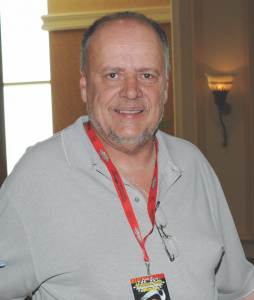
BAUCOM: No.
Oh, well. Was worth a shot.
WAITT: How many entertainer employee/contractor lawsuits have you had filed against you.
BAUCOM: About a dozen.
WAITT: Did you have to pay on all of them?
BAUCOM: Yes sir. It’s not so much the entertainers. It’s the ambulance-chasing lawyers who say, “Hey, sign this paper. I’m gonna get you hundreds of thousands of dollars.” And when the smoke clears, the lawyer gets that money. The dancers walk away with $5,000 or $10,000. If they’re lucky.
WAITT: Did you ever think that the employee versus independent contractor issue that was discussed at the first EXPO 30 years ago would still be unsettled today?
BAUCOM: I was at the first EXPO. I’ve been to every one of them. I’ll tell you who predicted the future of this problem at the first EXPO; it was Harry Weisbrod, that accountant guy. He was way ahead of the ballgame on that.
WAITT: Should all of the clubs have just agreed at the very beginning to classify entertainers as employees?
BAUCOM: You got clubs where their net profit is huge. But there’s a lot of clubs out there running on a very thin line as far as net profit goes. So to add a big expense like paying employment taxes and Social Security and Medicare, that would push them over the line to the point where they wouldn’t survive.
WAITT: A lot of strip clubs have closed down in recent years. Some because of Covid. Some because of the economy.
BAUCOM: You know, some of it is by their own means. Some of it’s what the city is doing. There’s some markets where we’re still a huge target. I feel blessed and lucky in my market. We have a good working relationship with the city. But that’s not the case in a lot of markets.
You have to put a face with the business. It takes a little time but you save it on lawyers bills. I’d rather sit at a community meeting for one hour than spend five hours in a courtroom.
For the district attorney, going after stripclub people gets front page coverage. The difference is, if they don’t know you, you’re just a stranger. But when they know you, when they know they’re going after Slim, that makes a difference. So I joined the Greater Charlotte Hospitality & Tourism Alliance. They represented all the big hotels and restaurants. I got on the board of directors with them. I was going to meetings with these city attorneys.
WAITT: So you became a real person to them.
BAUCOM: Right. I wasn’t just a strip club owner to them. Now it was Slim’s places.
WAITT: You are a religious person, which is not something most people think of when they think of a stripclub operator. You said in one news article that, “I have not been saved or baptized, even though I go to church and believe in God very strongly. It’s an internal battle I have within myself all the time: the stripclub aspect versus the godly aspect.” How do you reconcile the two?
BAUCOM: It’s hard to answer that. I’m very active in my church. The pastor knows what I do. The whole congregation knows what I do, and they have never judged me. Actually they’ve been very, very friendly. Although the pastor does make me sit in the front row.
WAITT: You do have other non-adult businesses, but do you ever feel guilty about that part of your livelihood that involves this industry?
BAUCOM: I’ve never been ashamed of my involvement in this industry. The only hindrance is that, I’m sure if I was to stand in front of God today and ask him, “Do you mind if I keep running my stripclubs?” he would say no. So that plays on my conscience a little bit.
But at the same time I had a preacher say to me once, “God has a plan for everybody and everything. And Slim, I’ve done some checking on you. All your people love you. Your dancers love you. You treat ‘em all with respect. You treat ‘em all good. Maybe you’re exactly where you are supposed to be.”
WAITT: You have set aside space in your corporate offices for religious groups who counsel entertainers. You own a house that is used as a safe house by Restoration Link for families and women in transition. And you’ve hired teachers to help your entertainers get their GEDs. Why?
BAUCOM: You want to give back. If you are blessed, you need to bless others. Blessings are a hand-me-down. If somebody hands it down to you, you need to hand it down to somebody else.
When the church people came to me, it’s probably 15 years ago, they wanted to go into all my clubs into the dressing rooms and talk to the girls. I said okay, but I don’t want any of my girls to feel like they’re being judged, or looked down on or being condemned.
And they promised me they wouldn’t, and they haven’t. A few of the girls have left this industry and followed them into the church world. When people ask me if that bothers me, I always say, “Losing a dancer to the competition stings. But if I lose a dancer to the man above, I can live with that.”
WAITT: I don’t think you lose many dancers to the competition. I remember talking to some club operators from the Carolinas once and the subject of poaching dancers came up.
“We send our people in to steal dancers all the time,” one of them said.
Which clubs, I asked. “All of them,” he said. “Except Slim’s clubs.” Why not Slim’s clubs, I asked?
“We know better,” he answered.
Does that story surprise you?
Baucom just looks at me and doesn’t answer. There is neither a knowing smile or an angry scowl on his face.
“You want to give back. If you are blessed, you need to bless others.”
– Slim
WAITT: No comment?
BAUCOM: No comment.
Baucom pauses, thinks about the exchange we just had and then elaborates.
BAUCOM: I go to all my competitor’s clubs. They welcome me with open arms. They know if I’m in there and a dancer comes up to me and starts talking to me about work, I’ll stop ‘em dead in their tracks. I say to them, I will not talk to you about that. Not here. That’s disrespectful to the people who own this club. So, I’m showing respect and courtesy to the club. But it’s unfortunate because that’s not a feeling that’s shared across the industry.
Which is ridiculous. If the ABC law enforcement is out, checking the clubs, if they go into one of my clubs, my managers know to call all the competition and warn them also. Now, if I can shut down my competition by out promoting ‘em and outdoing ‘em, I will do it in a minute. But I’ll fight just as hard as they will to keep the Man from shutting them down. Because if he shuts them down, he can shut me down.
Years ago, someone told me Baucom was upset with ED Publications for some reason. So I flew up and met with him. When I explained why I had come up, Baucom said, “Nobody speaks for me. I got no problem with ED. If I have a problem, I’ll let you know myself.” Baucom took me on a tour of his clubs and we stopped to have dinner at The Men’s Club. When our food arrived I said, “Slim, I don’t understand. You own a bunch of clubs in this city. Why are we having dinner at your competition?”
Slim’s answer, like the man himself, was to the point and reasonable: “Because they make the best steak in town.”
On this most recent trip, we do a dinner repeat at The Men’s Club, again for steak. Two managers come over and shake his hand. A cocktail waitress who used to work at one of his clubs comes over and they catch up.

WAITT: Deserved or not, you have a reputation of being someone you don’t want to cross. You were once quoted in a news article saying, “I’ve heard that I’m a pimp, a gun runner. I’ve been accused of being an Outlaw and accused of being a Hells Angels. I don’t know why people think that.” Why does everybody think you’re either a current or former outlaw biker?
BAUCOM: Well, there are so many of ‘em around that work here. That guy you saw downstairs earlier, he’s president of the Charlotte Outlaws. I have a good working relationship with ‘em, and I made it clear years and years ago; you show me respect and you’ll get respect and they’ve held up their
end of the bargain. I’ve also had dealings with the Hells Angels, and have had a very good working relationship with them throughout the years as well. I just try to get along with all of them. If I have some of ‘em in the club and there’s an issue with one of the members, I’ve seen ‘em handling it themselves, breaking it up quickly.
WAITT: So, you like the biker lifestyle?
BAUCOM: I got my first Harley when I was 18 years old. I have eight Harleys right now. I’ve been a biker my whole life.
WAITT: And there are no colors hanging in your closet?
BAUCOM (smiling): Not today.
“I made it clear years and years ago; you show me respect and you’ll get respect.”
– Slim
WAITT: Another surprise for some people would be that you don’t drink, don’t smoke and don’t do drugs. Did you ever indulge in any of those bad habits?
BAUCOM: I’m 68 years old now and I’ve never tasted alcohol. I couldn’t tell you what a beer tastes like, or a mixed drink. I’ve never smoked. I’ve never done drugs. I brainwashed my kids from the time they was barely walking. I would go up to them and say, what’s the three promises? Don’t drink, don’t smoke and don’t do drugs. And they never have. I added a fourth promise awhile ago: put God first. Now I’m teaching the four promises to my grandkids. I go up to them and say, what are the promises? I still tell my own children, “When I’m 90-years-old and you’re 70-years-old if, I walk up and see a beer in your hand, I will take my cane out and beat you.”
WAITT: Why are you so averse to those vices?
BAUCOM: Well, my mother never drank, but my father had a huge drinking problem and it caused us to suffer as a family and go through some hard times. I swore to myself that my kids would never go through what I did.

WAITT: The Charlotte Observer said that in addition to over a dozen stripclubs, you and your family “control trucking, construction and assorted other companies.” Sounds like they were trying to paint you as the Sopranos of the Carolinas.
BAUCOM (laughing): Yeah, I got people sitting in lawn chairs out at the construction site.
The truth is, after reading a dozen articles in the Charlotte Observer that featured Baucom over the years, the articles seemed to be fair for the most part. Baucom says he has a good working relationship with the press, just as he does with city officials and law enforcement.
BAUCOM: If there’s a problem, they don’t say, call that stripclub guy. They’ll pick up the phone, call me and say, Slim, is this shit going on? I say, if you have a problem with it, it’ll be stopped today. That’s all they gotta do. And they tell the other people to just call me and the problem is solved. I listen to what they have a problem with and I tell them I will fix it immediately. I’m honest with them. I don’t try to bullshit them.
I tell my managers, when ABC or vice come in, if they ask you something, you never lie to them, even if it’s detrimental toward me. You tell ‘em the truth. You don’t want it to be like the little boy who cried wolf. You know, where you do finally tell them the truth but they don’t believe you because before you lied so much. I tell them, these people aren’t dumb. You’re making yourself look dumb by trying to lie to ‘em. If you want to keep your business going, you abide by the rules.
“I listen to what they have a problem with, and I tell them I will fix it immediately.”
– Slim
The two days I am in Charlotte, it is cold, rainy and overcast.
WAITT: Does the sun ever shine here?
BAUCOM: Of course it does.
WAITT: You’ve been in Charlotte since you were seven. Ever think of moving?
BAUCOM: I’ve been all over the world and I haven’t found anywhere I wanted to move to. I like it here.
Baucom has three sons—WD, Daniel and Little David, and a daughter, Tracie. WD runs their glass manufacturing company, Little David handles their trucking company, Daniel handles “a smorgasbord of stuff, from ATMs to working with the accountant,” and Tracie is the office manager. Baucom has two brothers, Timmy and Virgil, who help run the clubs. A third brother passed away from cancer in his 40s. Baucom’s sister, until her retirement a few years ago, had been the office manager. Everything with Baucom is a family affair.
Baucom’s three sons have all done well on their own, independent of his stripclub empire. They all pitch in when needed and Baucom knows if something happens to him they will take over. That said, none of them have expressed an interest in taking over the adult club operations at this particular point and time, “although they will jump in at a moment’s notice when I need help. And I know they will eventually step up and keep it going.”
WAITT: The children of successful parents sometimes have a hard time making their own way. But your sons have all gone on to become just as successful as you in other areas. Do you think they saw your work ethic and wanted to impress you or is it just in their genes?
BAUCOM: From the time they was kids, they had to work. This is before they changed the laws. I remember my sons being 14 and 15 years old at the stripclub, sitting at the front door, collecting the money, while they were doing their homework.
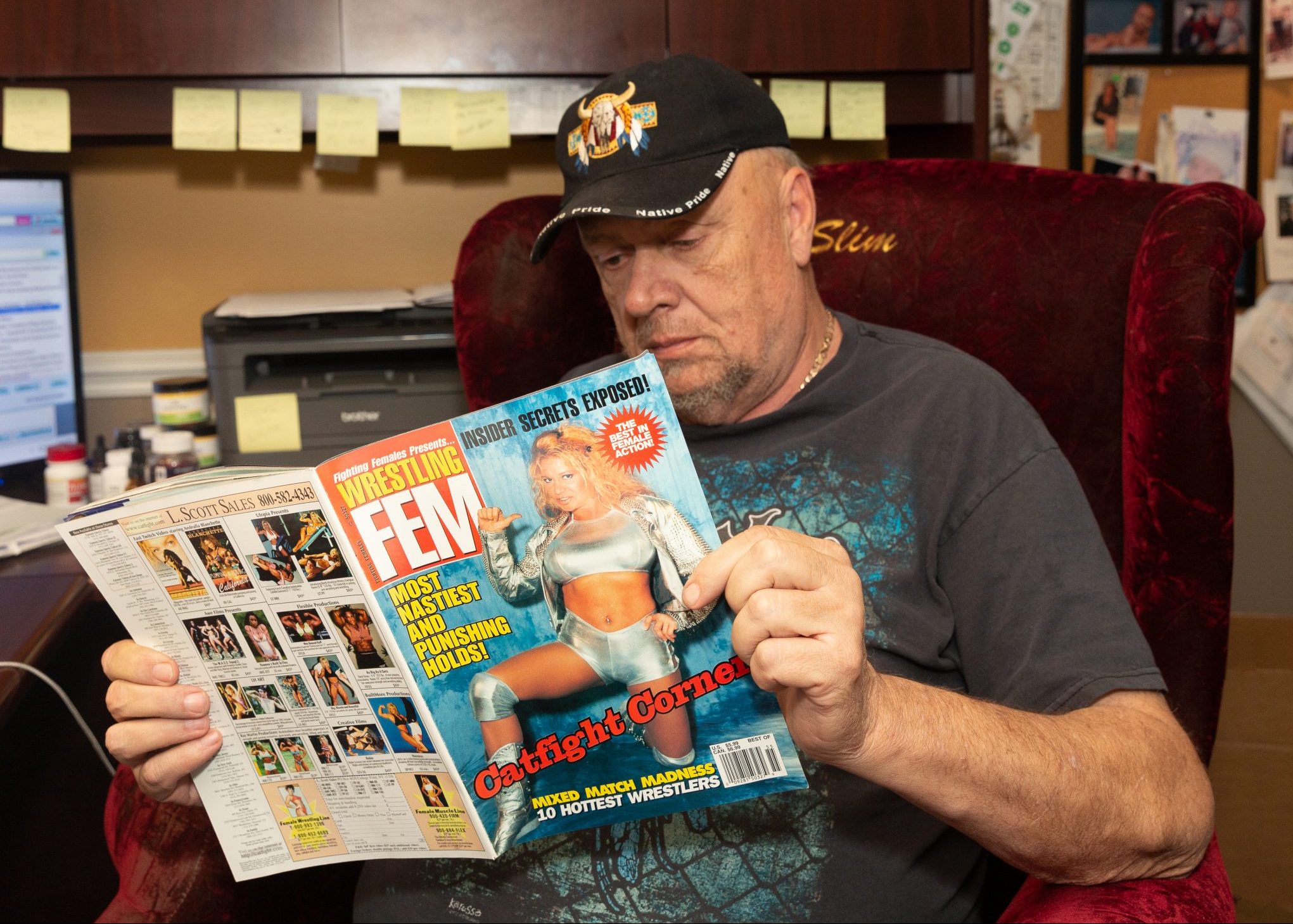
WAITT: What other key people are in your organization who are not family members and what do they do?
BAUCOM: Justin Driscoll has been with me about 15 years. He started right out of high school. He’s a graphic artist and does the internet stuff. And Rick Cutchin, Big Rick, is very valuable. He works on the computer generating reports and anything I need pulled up.
WAITT: Do you have a regional manager?
BAUCOM: No, just me and my brothers.
When we leave his office, Baucom drives by a street he owns. Well, he doesn’t actually own the street, but he owns most of the houses on it. Family members occupy almost all the houses on the street. His two-story house is also on the street but he only stays there one night a year. He prefers the office/bedroom/kitchen on the second floor of the warehouse. “I tell everyone I live in a penthouse suite on a three-acre lot in a gated community,” says Baucom, as the sliding fence gate opens and we drive off the lot in his huge pick-up truck.
WAITT: You also started a company called Bar Man Control, a POS, inventory control, entertainer tracking, dance dollars, time/attendance system. Why offer a system to other clubs that could compete with you?
BAUCOM: I think of it as be a benefit to all club operators. I am surprised that so many operators, even some of the big operators, don’t do inventory control, and if they do do it, they only do it once a month. So if they’re short, nobody’s held responsible for it. What Bar Man Control does is hold the bartender and the manager responsible at the end of every shift. If they are short, they pay it before they leave. I think Bar Man, just off of the inventory stuff, will boost your bar sales, or at least the money that’s supposed to be there, by 20 to 25 percent.
WAITT: Where are the losses coming from?
BAUCOM: It’s over-pouring. It’s rocking the bottle. It’s theft. Your friends come in and you give ‘em free drinks. The list goes on and on. I went into a club last month and I watched a guy come in, put a $20 bill in the tip jar, and say, Okay, now I’ll drink free all night. And he was right. He drank free the rest of the night.
WAITT: Does the amount of over-pouring and theft increase the bigger your club chain is?
BAUCOM: Yes. If you only have one club, then you’re in there, you’re watching everything. But if all of a sudden you got 10 clubs, you can’t be there all the time. The bigger you are, the more checks and balances you need to have in place to keep up with your growth. Bar man Control helps you do that.
“The bigger you are, the more checks and balances you need to have in place.”
– Slim
WAITT: Back in 2014 you had your own Watergate if you will. Former Charlotte Mayor Patrick Cannon was convicted in a federal corruption probe on charges he took money for political favors. It was alleged that one of the people he accepted money from was you to help with a zoning issue, but you were never charged.
BAUCOM: I gave him $2,000, right? That was the limit I could give him. It was perfectly legal, perfectly above board. But the news people made an issue of it because it was tied to a stripclub owner. But if I’d have been a gas station owner, it wouldn’t even made the news. The feds was after him for three years, hanging this carrot over him. And he finally took a bite of it.
Knowing that, because of the business he is in, he will always have to look over his shoulder, Baucom realized early on it was best to walk the straight and narrow.
BAUCOM: In the ‘80s, I shoe-boxed my money, put cash in the shoe box. But then as I started adding more clubs, I had to quit doing that because someone says, oh, he pissed me off, I know what he done. I’m gonna turn him in to the IRS. The IRS did come after me in the early ‘90s. Pretty big audit. I was smart and thought I was doing everything, hiding everything. They’d never catch me. But they seen it done a thousand times before. I didn’t have a single great idea on my own. So my accountant told me, he says, “Slim, you report everything. We can get creative with the expenses. We’ll stand on top of the line, but we won’t cross it.” He said, “What can you do with cash? You can go buy a shirt or some groceries. You aren’t gonna go buy no boat or a car.”
So I followed his advice.
WAITT: You were one of the first operators to sound the alarm about the internet and online pornography and its ability to negatively impact attendance at strip clubs. And it seems to be happening now.
BAUCOM: It’s gonna get worse. As technology improves and develops, it’s going to have a bigger impact on us. It’s not going to be long before you have a hologram dancer standing right in front of you in your home.
The internet and cell phones may have cut back on personal interaction between men and women, but it gave Baucom a great idea for a unique club promotion.
At 11:30 pm every night at Baucom’s Scores club they do a “Lady’s Choice” slow dance to Percy Sledge’s song “When a Man Loves a Woman.” Each entertainer picks a guest from the crowd and they all go on the mainstage to do a slow dance. The slow dance is free, and, obviously, the hope is that the free dance then leads to some paid dances. “The whole stage is slap full of couples dancing,” says Baucom. “People start showing up at 11:15 pm. They rush in. A lot of these guys have never slow danced with a girl before.”
WAITT: What is your typical workday like?
BAUCOM: I get up at 6:30 every morning. I’m downstairs at seven, to get the boys, the maintenance crews and all that stuff, working. I like going out with the crews, doing the work. I like working in the shop downstairs. If I got a work order come in that night, there’s a commode stopped up, if I gotta get the plunger and go over there, I do whatever it takes.
I’m not a big breakfast person. I usually do lunch. This place closes down at four o’clock. So then I come up here (the upstairs office), look through the paperwork and spreadsheets from the night before. I’ll chill out and watch a little TV, then take a shower, get dressed and go by some of the clubs. I used to leave here at 10 o’clock, but now if I’m here at that time I’ll be asleep. So I try to get out of here by 8 o’clock. Lot of times my dinner is drive-thrus. And DoorDash. I love DoorDash.
WAITT: What do you do at those clubs when you go in?
BAUCOM: I have this knack, within two minutes I can tell you if there is a light bulb burnt out. All the little stuff that nobody’s catching. I talk with the managers, chitchat with the girls and the staff. The key is not so much what you do; it’s just your presence. I’m not going in there and making big decisions. Do this, do that, whatever. No, sometimes it’s just walking in and saying hello to everybody.
WAITT: Are they nervous when you show up?
BAUCOM: No. Because I’m not one to go in and chew ass. If I have to, I do it in a respectful way, I call ‘em off to the side and we talk.
WAITT: You were at the very first Gentlemen’s Club EXPO 30 years ago; you have been a consistent advertiser in ED Magazine and sponsor at EXPO; and you are a longtime member of the ACE National Board of Directors and also the Tarheel Entertainment Association, a Carolinas statewide chapter. Why is it important to you to be involved in supporting and improving the industry?
“I learn something from every EXPO I attend; I come back and tell everybody ‘this is my idea’.”
– Slim
BAUCOM: Because if the industry fails, I fail. I’ve always thought we’re stronger together instead of being splintered.
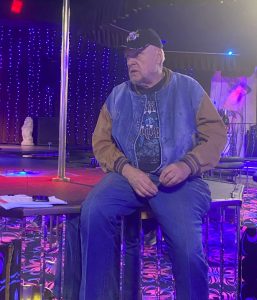
WAITT: Does it surprise you that after 30 years some big club operators have never been involved with the EXPO or industry associations.
BAUCOM: I don’t know whether they think they just know it all and there’s nothing to be learned there, but they are mistaken. Because I have learned something at every EXPO I have attended. All my best ideas and operational stuff comes from stealing ideas from other people. I love it, you know, coming back here from the EXPO and telling everybody this is my idea.
WAITT: You and I have argued about this for years but I swear that there is a picture of you from the very first EXPO at the Stardust Casino in 1993 and you are wearing black leather pants. Why do you keep denying it?
BAUCOM: Because that never happened. Never in my life have I worn black leather pants.
WAITT: I’m going to find that picture and send it to you. When you were inducted into the ED Hall of Fame at the 2004 EXPO, and you had to walk up on stage and give your acceptance speech, you told me it was the scariest thing you’d ever done in your life. Why was that?
BAUCOM: I’m just not very good speaking in front of people. That was huge, one of the biggest honors of my life, to receive that award and go up on stage. But at the same time it was nerve wracking. And I’ve gone up there two or three other times since then, and every time I go up it doesn’t get any easier. I’m always thinking, I’m fixing to pull a Joe Biden and trip and fall.
WAITT: You just bought that club in Pensacola, Sammy’s. Why another club? Shouldn’t you be fishing or golfing?
BAUCOM: I’ll never retire. A day without work, to me, is a wasted day. I’ll have to take a half a day off from work just to go to my own funeral. I see so many people work their whole life and retire and six months later they’re dead. If I was sitting in front of a TV watching Law & Order all day long it would drive me crazy.
Baucom says his goal when he first started in the business was to get to a point where he didn’t have to work. He loves to work, but he doesn’t have to work. That’s the point. “I busted my ass so I would have a choice. Now I work because I like to; not out of necessity.”
“Now, if I can shut down my competition by out promoting ‘em and outdoing ‘em, I will do it in a minute. But I’ll fight just as hard as they will to keep the Man from shutting them down. Because if he shuts them down, he can shut me down.”
– Slim
WAITT: Describe the perfect club you would want to buy. Is it based on what city or state it’s in? Is it based on the size?
BAUCOM: It would be based on the deal, the money that’s involved. It would be based on the revenue, both gross and net. It would be based on the reputation of the club and the competition in the area. Is it something you could change out easily? Are you going to be left with a good staff or do you gotta start all over again.
WAITT: Let’s say you were offered two clubs at the same selling price. One is operating perfectly at 100 percent and the other one is only operating at 80 percent, but you know you can get it to 100 percent. Which club are you going to buy?
BAUCOM: I want the 80 percent club.
WAITT: I knew it! Is the industry still exciting to you?
BAUCOM: Absolutely.
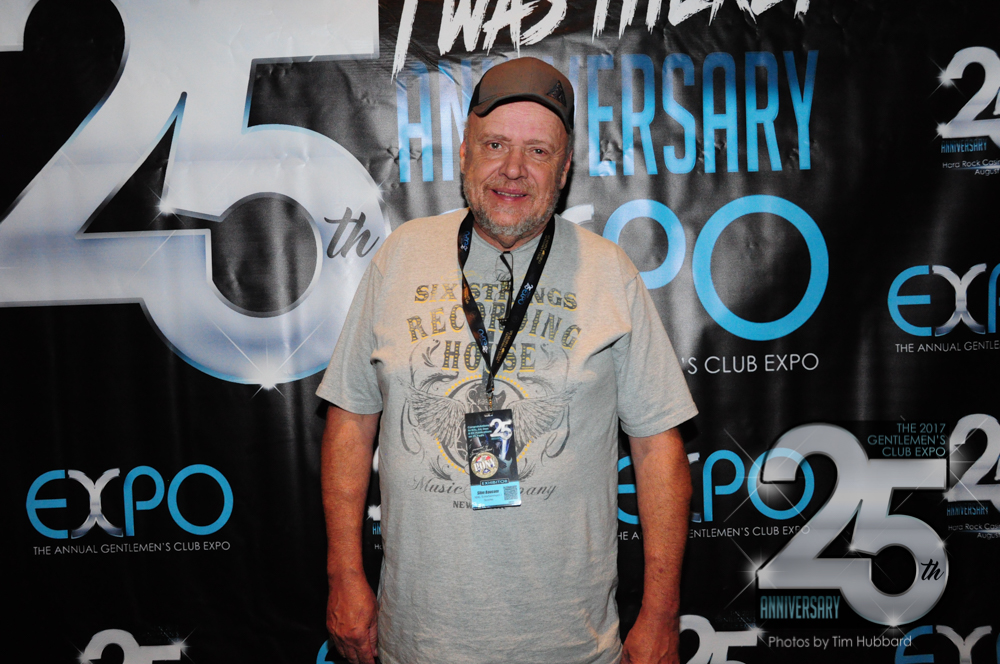
WAITT: Why do you think that is? Why is the magic still there?
BAUCOM: Well, it’s a job where I get to provide employment for thousands of entertainers and staff and I get to provide entertainment for hundreds of thousands of people.
WAITT: Awhile back the Charlotte Observer was doing an in-depth profile on you and you were concerned they might do a hatchet job. They interviewed me for the article as the publisher of the industry’s trade magazine and they quoted me as saying, “Slim Baucom is the nicest and most well respected club owner in the industry.” Hearing that incredibly nice quote from me again, do you now feel guilty about not cutting me in on that big slot jackpot you won?
BAUCOM: No.
* * *
NEXT ISSUE: The Founders Interview with a man who has helped hundreds of adult nightclubs to stay open and be successful by winning battles against their formidable opponents—First Amendment attorney Luke Lirot.
















